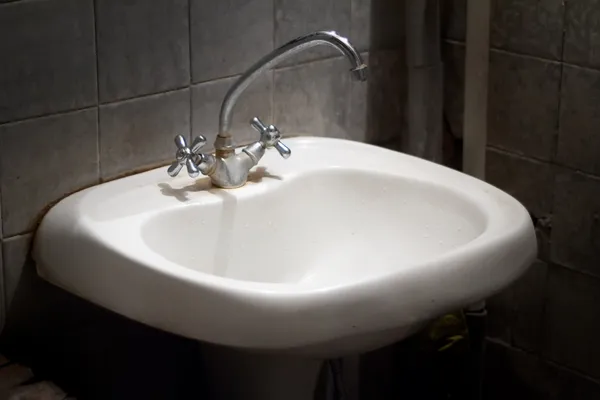
A musty smell emanating from your bathroom sink can be quite unpleasant and often indicates underlying issues that need to be addressed. It’s important to understand the causes of this odor and take appropriate measures to remove it.
What Causes the Musty Smell in Bathroom Sink?
The musty smell in a bathroom sink can be caused by a variety of factors. One common cause is the buildup of bacteria and mold in the sink drain. When water and debris accumulate in the drain, it creates a moist environment where bacteria and mold can thrive, leading to the unpleasant odor.
Another cause could be a clogged or blocked vent pipe, which can prevent proper air circulation and cause the smell to linger. If there is a leak in the plumbing system, it can result in stagnant water that produces a musty odor.
How to Remove Musty Smell from Bathroom Sink
In this section, we’ll explore some effective methods to banish that odor and leave your bathroom smelling fresh and clean.
Cleaning the Sink Drain
- Begin by cleaning the sink drain of any debris or visible dirt. Take a cloth or paper towel to wipe away grime and residue.
- After removing the visible dirt, pour one cup of baking soda down the drain. Baking soda is a natural cleaning agent that effectively neutralizes odors.
Flushing the Drain with Hot Water and Vinegar
- Pour a half cup of white vinegar down the drain. Vinegar, a natural disinfectant, can effectively eliminate any bacteria or mold responsible for the unpleasant musty odor.
- Gradually pour the hot water down the drain to help eliminate any debris or buildup that may be contributing to the odor.
- Allow the hot water and vinegar mixture to sit in the drain for approximately 10 minutes, enabling it to penetrate and cleanse the pipes.
Using Baking Soda and Lemon Juice
- Begin by combining baking soda and lemon juice in a small bowl until a paste is formed.
- Apply the paste directly onto the sections of the bathroom sink that are producing the musty odor.
- Gently scrub the affected areas using a soft-bristle brush or sponge, ensuring that all surfaces are covered.
Baking soda and lemon juice are natural cleaning agents that can effectively neutralize unpleasant odors. The alkali properties of baking soda help eradicate odor-causing bacteria, while the acidic qualities of lemon juice aid in breaking down and eliminating stubborn stains.

Using Commercial Drain Cleaners
- Choose a reputable brand of commercial drain cleaner.
- Carefully pour the recommended quantity of drain cleaner directly into the sink drain.
- Allow the drain cleaner to sit for the specified duration, thereby disintegrating any organic substances responsible for the odor.
By employing commercial drain cleaners, you can effectively combat the musty smell in your bathroom sink by breaking down any organic matter causing the odor.
Preventive Measures to Avoid Musty Smell in Bathroom Sink
Preventive measures are key to avoiding that unpleasant musty smell in your bathroom sink. In this section, we’ll dive into practical strategies to keep your sink smelling fresh.
Regular Cleaning and Maintenance
To ensure a clean and fresh-smelling bathroom sink, regular cleaning and maintenance are essential. Regularly check and clean the sink drain by removing hair, soap scum, and other debris that can cause unpleasant odors.
Once a month, regularly pour a mixture of equal parts vinegar and hot water down the drain to help eliminate any bacteria or odors. Make it a habit to regularly clean the sink, at least once a week, to maintain a clean and odor-free bathroom environment.
Keeping the Sink Dry
- After using the sink, wipe down the surfaces with a dry cloth to remove any moisture that can contribute to the musty smell.
- Instead of leaving wet items, such as sponges or dishrags, in the sink, make sure to wring them out and hang them up to dry.
- To control humidity levels, consider using a dehumidifier in the bathroom. Lower humidity discourages mold and mildew growth.
- Mold and mildew thrive in dark, damp environments, so keep the sink area well-lit to deter their growth.
Using an Overflow Drain Cover
When dealing with a musty smell in the bathroom sink, incorporating the use of an overflow drain cover can help prevent the odor from entering your bathroom. Attach the overflow drain cover to the sink by carefully following the manufacturer’s instructions.
Checking for Plumbing Issues
- Check for leaks: Inspect the area under the sink for any signs of leaks, such as moisture or water stains. Check all connections and pipes for any visible cracks or damage.
- Checking for plumbing issues: Test the water pressure: Turn on the faucet and check if the water pressure is consistent. Low water pressure could indicate a plumbing issue that needs to be addressed.
- Check the trap: Remove the trap beneath the sink and inspect it for any debris or blockage. Clean the trap and ensure it is properly connected back in place.

- Inspect the vent system: The plumbing vent is responsible for allowing air to escape from the drainage system. Check for any obstructions or damage in the vent pipe that may be causing the musty smell.
- Look for mold or mildew growth: Inspect the surrounding areas of the sink, including the walls and cabinets, for any signs of mold or mildew. These can contribute to the musty smell and may require professional remediation.
Transform your space with Ivy Cleans, an expert cleaning services company based in Minneapolis, Minnesota. Our expert team delivers top-notch cleaning services tailored to your needs. Experience a spotless home or office today. Schedule your cleaning and enjoy a fresh start with Ivy Cleans.
